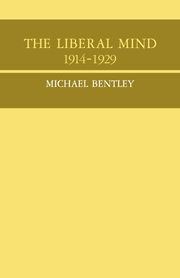5 - The Liberal intelligentsia
Published online by Cambridge University Press: 04 May 2010
Summary
In this atmosphere great seed could be sown by the spiritual and intellectual leaders …
Smuts to Murray (copy), 7 December 1917, Murray MSS, Box 47.Asquith appeals only to intellectuals, a very small party in this blessed nation.
Esher to L.B., 25 June 1923, Journals and Letters, IV, 289.This weekend I have 14 professors at Churt.
Lloyd George to Dame Margaret Lloyd George, 22 September 1926, in K. O. Morgan (ed.), Lloyd George Family Letters, 207.The student of twentieth-century Liberalism must take as his focus the activities and aspirations of the Liberal party, since the selection of any other perspective would remove from the raw material such bones as it possesses. Yet if it is clear that the Liberal party stands at the centre of Liberalism it is clear also that the two phenomena are not co-extensive. Contemporary material presses very strongly on the historian the instinct that to examine the nature of Liberalism is to do more than to recount the doings of members of the Liberal party. It has already been seen here that Liberalism can be found in other sectors of the parliamentary scene, beyond the boundaries of the Liberal party. Similarly, there existed areas of Liberal ‘society’ which it is important to recognize when trying to frame an understanding of Liberal politics. One section of that society was of particular importance to politicians. High politics, after all, was conducted by an exclusive elite; it should be no surprise that its practitioners were most interested in the elite of Liberal society: the intellectuals, the journalists, the Churchmen.
- Type
- Chapter
- Information
- The Liberal Mind 1914-29 , pp. 160 - 206Publisher: Cambridge University PressPrint publication year: 1977



